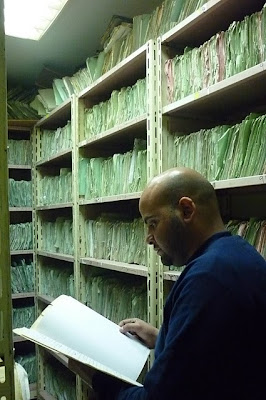Thirteen people were killed during clashes on Tuesday evening between hundreds of Copts and Salafists (Muslim fundamentalists) in the Zarayeb district of Muqattam in Cairo, the Egyptian health ministry said Wednesday. A local priest, Samann Ibrahim, told AFP that at the hospital there were at least six bodies of Copts, all of them shot. According to the health ministry 110 people were injured.
The protests broke out after 1000 Christians, mainly so called Zabaleen (families who make a living collecting garbage) held a demonstration in the Zarayeb district to voice their anger over the burning of a Coptic church (Knissa Shuhadain, Two Martyrs Church) in the town of Atfeeh in Helwan in south Cairo last Friday. The Coptic protesters blocked the Autostrad highway leading to Muqattam for two hours. The protesters clashed with residents from the neighbouring Ayisha suburb.
 |
| Protester holds flyer with picture of Camilia Shehata |
The Salafists, who wish to return to a more Islamic state, also demanded that Article 2 of the Egyptian constitution, which stipulates that Islam is the religion of the state and sharia (Islamic law) is the principle source of jurisprudence not be amended. Clashes broke out and, according to a security source, the two groups threw stones and Molotov cocktails at each other.
The demonstration by the Zabalin was held independenly from the demonstration that Copts are holding since Sunday at the Television building in Maspero in Cairo to protest the burning of the church in Atfeeh. Some Muslims also joined this crowd of about 1000 people.
Witnesses and a security source said the church in Helwan was torched after a row sparked by a relationship between a Christian man and a Muslim woman. Such interfaith relationships often cause tensions in Egypt. The Islam, the religion of the majority does not allow marriages between Coptic men and Muslim women, unless the man in question converts to Islam. Members of the woman's Muslim family clashed among themselves over the affair and two Muslim men were killed. Muslims from the woman's village then burned the church on Saturday, witnesses said.
The clash is a serious challenge to the army's ability to maintain order in an Egypt that in many ways is in a state of revolutionary transition. One other - no less serious - challenge is what was uncovered after people entered the deserted building of the hated State Ecjurity Service in Cairo (and also other places), after a lorry was discoverd full of shredded and destroyed files from the archives near the State Security hadquarters in Nasr City.
 |
| People trying to enter the State Security building |
 |
| Shredded State Security files |
 |
| Personal Files of the SSS |
Others have already written good stories about the significance of what has been found. Reuters wrote this report, blogger and researcher Sarah Carr gave a beautiful impression here, and Issander al Amrani (Arabist) wrote in a column that the magnitude of the repression may ask for the installation of a South-African style Truth and Reconciliation commission.
We knew of course about this institution and the way how it dealt with (and sometimes literary butchered) opposition that was seen as as serious threat to the regime like the islamists. One of the last times we saw a glimpse of how it used to act was on this 'Black Wednesday' during the days of protest at Tahrir Square. The last word about the SSS has not been spoken yet, so much is clear.


.jpg)



No comments:
Post a Comment